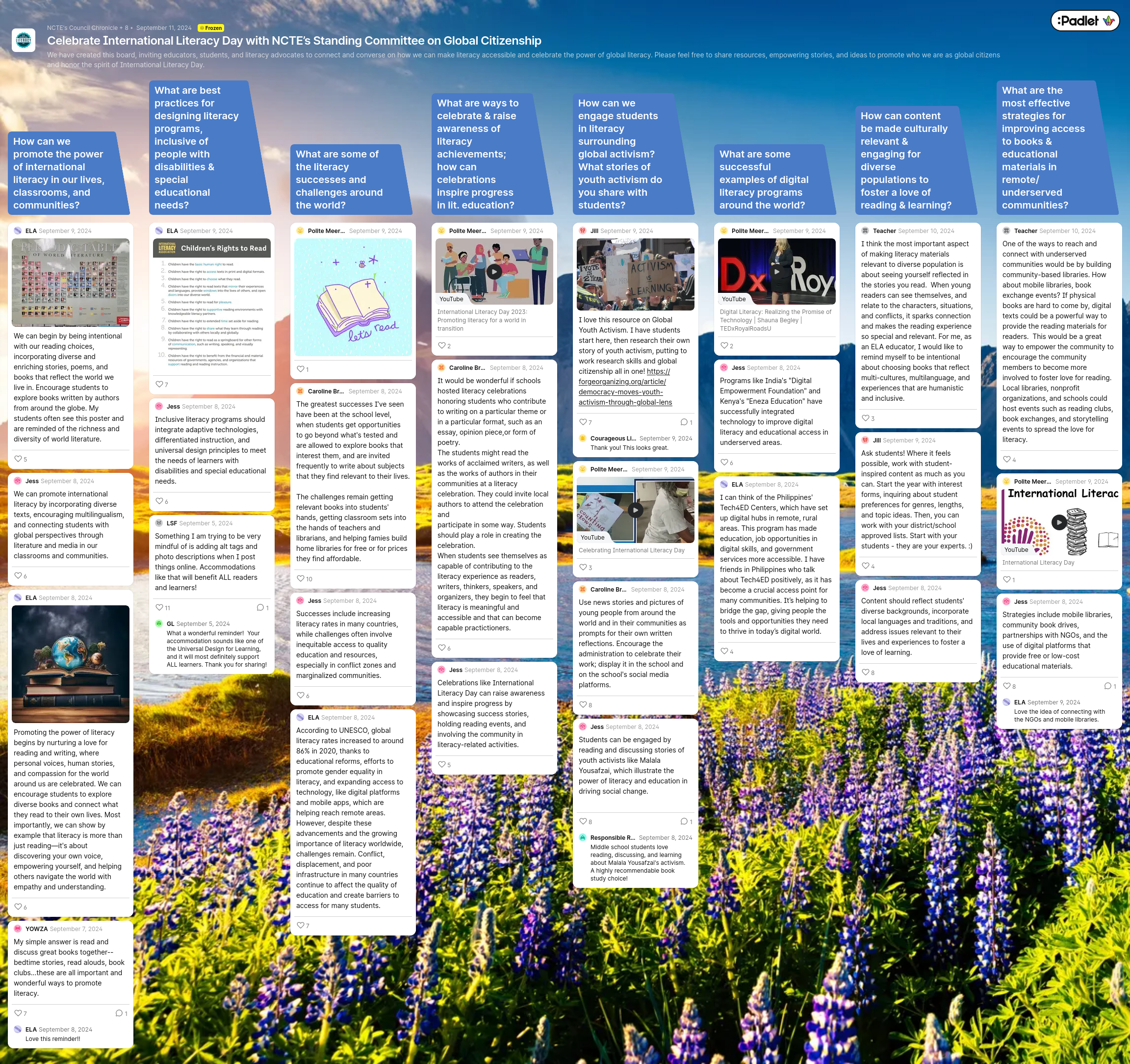Get Involved
We are the organization we are today because of the expertise, time, and energy of our members. What role will you play in moving NCTE forward?
Celebrate International Literacy Day with NCTE’s Standing Committee on Global Citizenship
As we approach International Literacy Day on September 8, NCTE’s Standing Committee on Global Citizenship invites you to join us in celebrating the power of literacy as a fundamental human right and as a source of inspiration for global citizenship. We celebrate our human rights and dignity as advocates for a literate world; increasing literacy globally provides access to learning, education, and life experiences through the power of literacy.
We created a Padlet as a platform for a slow chat inviting educators, students, and literacy advocates to connect and converse on how we can make literacy accessible and celebrate the power of global literacy. Please feel free to share resources, empowering stories, and ideas to promote who we are as global citizens and honor the spirit of International Literacy Day.
You can find and contribute to the Padlet September 5–10, and you can preview the discussion prompts below.
Padlet Questions/Conversation Starters:
- How can we promote the power of international literacy in our lives, classrooms, and communities?
- What are the best practices for designing literacy programs that are inclusive of people with disabilities and special educational needs?
- What are some of the literacy successes and challenges around the world?
- What are some ways to celebrate and raise awareness of literacy achievements worldwide, and how can these celebrations inspire further progress in literacy education?
Conversation Starters on Global Activism:
- How can we engage our students in literacy surrounding global activism? What stories of global youth activism in particular do you like to share with your students?
- What are the most effective strategies for improving access to books and educational materials in remote/underserved communities?
- What are some successful examples of digital literacy programs around the world?
- How can content be made culturally relevant and engaging for diverse populations to foster a love of reading and learning?
Resources:
Picturebooks
Black Gold by Laura Obuobi and London Ladd
A Family Like Ours by Frank Murphy and Alice Lee
Gibberish by Young Vo
I Am Enough by Grace Byers and Keturah A. Bobo
We Who Produce Pearls: An Anthem for Asian America by Joanna Ho and Amanda Phingbodhipakkiya
Woke: A Young Poet’s Call to Justice by Mahogany L. Browne, Elizabeth Acevedo, and Olivia Gatwood
Graphic Novels:
Enlighten Me by Minh Lê and Chan Chau
A First Time for Everything by Dan Santat
Huda F Are U? by Huda Famy (Graphic Novel)
The Magic Fish by Trung Le Nguyen
Mexikid by Pedro Martín
Young Adult Literature:
American Street by Ibi Zoboi
Clap When You Land by Elizabeth Acevedo
Don’t Ask Me Where I’m From by Jennifer De Leon
Front Desk by Kelly Yang
Heartstopper #1: A Graphic Novel: Volume 1 by Alice Oseman
Home Is Not a Country by Safia Elhillo
Invisible: A Graphic Novel by Christina Diaz Gonzalez and Gabriela Epstein
Louder Than Hunger by John Schu
Love Hate and Other Filters by Samira Ahmed
Saints of the Household by Ari Tison
The Silence That Binds Us by Joanna Ho
Wild Tongues Can’t Be Tamed edited by Saraciea J. Fennell (short stories, various)
Novels:
Americanah by Chimamanda Ngozi Adichie
The Reluctant Fundamentalist by Mohsin Hamid
The White Tiger by Aravind Adiga
Poetry:
Chrome Valley: Poems by Mahogany L. Browne
Good Son by Kyle Liang
The Gutter Spread Guide to Prayer by Eric Tran
Reliquaria by R. A. Villanueva
Short Film Starring My Beloved’s Red Bronco by K. Iver
We Alive, Beloved: Poems by Frederick Joseph
Memoir:
Born a Crime by Trevor Noah
Crying in H Mart: A Memoir by Michelle Zauner
Solito: A Memoir by Javier Zamora
Stay True: A Memoir by Hua Hsu
We Were Dreamers: An Immigrant Superhero Origin Story by Simu Liu
What My Bones Know: A Memoir of Healing from Complex Trauma by Stephanie Foo
Educator Resources:
Antiracist Reading Revolution [Grades K-8]: A Framework for Teaching beyond Representation toward Liberation by Sonja Cherry-Paul
Compose Our World: Project-Based Learning in Secondary English Language Arts by Alison G. Boardman, Antero Garcia, Bridget Dalton, and Joseph L. Polman
Decolonizing Middle Level Literacy Instruction: A Culturally Proactive Approach to Literacy Methods by Michael Domínguez and Robyn Seglem
Humans Who Teach: A Guide for Centering Love, Justice, and Liberation in Schools by Shamari Reid

